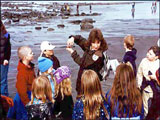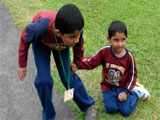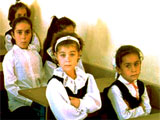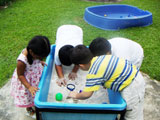Special Needs Programmes
Kindergarten Program
Objective:
The kindergarten curriculum at St Gerard's addresses the important areas of a child's growth and development,
namely, intellectual, social, emotional, and physical. The curriculum specifically covers language and
literacy, mathematics, social development, and science. The kindergarten program has two main goals:
1) to provide a wide range of experience and opportunities to help children get accustomed to the school
environment
2) to develop readiness for mainstream primary education
Teachers reach the goals with the children by teaching thinking skills, problem solving skills, effective
communication skills in addition to math and science concepts. Through this approach, children gain efficient
and effective learning strategies, develop confidence, and acquire more interest and curiosity about the world
around them.
Area of Focus
 Language and Literacy
Language and Literacy
 Math and Problem Solving Skills
Math and Problem Solving Skills
 Personal and Social Development
Personal and Social Development
 Social Skills
Social Skills
 Nature and Science exploration
Nature and Science exploration
 Physical Development and Health Education
Physical Development and Health Education
 Creative Development (includes Music, Arts & Craft, Speech & Drama)
Creative Development (includes Music, Arts & Craft, Speech & Drama)
 Computer Literacy
Computer Literacy
Support Activities
 Speech Therapy
Speech Therapy
 Occupational Therapy
Occupational Therapy
 Field Trips
Field Trips
Language and Literacy
Language is the foundation for communication and reading. The preschool years are prime years for acquiring and
applying language skills to develop competence to function in a language- based community and meet the
expectations of the mainstream school. A good oral vocabulary, for example, helps children understand stories
adults read to them, and stories they will later read by themselves. The goal of the language curriculum is to
help children develop effective use of language to participate actively in learning opportunities in school as
well as in the broader community.
Speaking: Children will learn to speak clearly to be understood without contextual clues by repeating patterns
of standard English language to communicate clearly, including using complete sentences and appropriate
grammatical usage (e.g., personal pronouns, subject/verb agreement), using verbal and non-verbal cues in
communication (e.g., facial expressions, proximity, gestures),etc. Children will also learn use of common
social conventions, such as "please" or "thank you," and words to communicate feelings
Reading: Children will follow an individualized reading program, monitored by the teachers. Phonics will
continue to be emphasized with focus on word blending and recognition of commonly used words. Children will
also learn to show appreciation for books by recognizing specific books by their covers, listening to stories
and reading simple stories.
Writing: Children will learn to trace letter shapes and start copying prints from the board. Children
will learn to write their own names on their artwork and classroom projects. Objectives -The student will
demonstrate the following abilities:
Listening: Children will learn active listening behaviors such as orienting to speaker, making visual
contact, and responding to cues, repeating sounds, segments, rhythms, and patterns of language in stories,
songs, and chants. Children will also be encouraged to carry on a conversation with another person that extends
a previously expressed thought or idea.
Math and Problem Solving Skills
The aim of the math curriculum is to motivate the children to explore mathematical concepts, and apply the
concepts to solving a broad range of real-life problem.
Children will begin to use simple strategies to solve mathematical problems by manipulating objects to represent
mathematical ideas, using number words during play to compare or solve problems, using mathematical language
appropriately (more, less, first, last), displaying data using real or concrete graphs [Statistics],Presenting
results using concrete objects and oral language
Children will also enhance their understanding of numbers and quantity by counting and becoming aware of the
purposes for numbers and counting. Play activities will include matching a set of objects with another set of
the same quantity, comparing sets of objects using these terms: more, less, and the same, etc.
Estimate whether a group of objects is more or less than five Children will also learn to sort objects into
subgroups that vary by one or two attributes, recognize and match objects with the same size and shape, identify
shapes identify sides and angles of two dimensional shapes such as triangle, square, and rectangle, etc.
Children will also apply measurement concepts by describing objects by relative size, height, length, weight,
and volume, comparing objects using terms such as big, little, heavy, light, wide narrow, empty, full, tall,
short, etc. Ordering objects by relative size, height, length, weight, and volume
Personal and Social Development
Growth and development in personal and social skills allow for children to benefit fully from experiences as
school. Children gain better understanding about themselves and demonstrate self-control. Other aspects of
personal and social development needed for successful functioning in the school environment include children's
approaches to learning, interactions with others, and social problem-solving. In an ongoing process of acquiring
and mastering skills involving cognition, language, emotions, and perception, children learn how to negotiate
within various settings, including the school setting.
The aim of this program is to develop the children to demonstrate effective personal and social functioning in
order to participate productively in all aspects of the school environment. The child's self-confidence will be
developed by encouraging participation in classroom activities, adapting playground games. Independence and self
direction will be encouraged by getting a child to ne activity out of several and becoming involved with it,
finding materials with which to work, attempting new experiences independently, etc.
Children will also learn to follow simple rules and procedures with gentle reminders like washing hands before
snack, clearing off place at the snack table, etc.
Children will learn to interact with one or more children by taking turns, sharing, and communicating during
play, working cooperatively with another child who is doing a similar task, etc.
Social Studies
It is important for young children to acquire knowledge about our social system as they prepare for adult
society. Through participating in the school or classroom activities, they learn about expected behaviors.
Students gain further knowledge by thinking about their peers and other people, and by considering the rules,
routines, and processes with which they are engaged in the classroom, at home, and in the community.
Children will learn about Singapore, its political systems, history, geography and diverse populations (People
of the Nations of the World) as they discuss their own families, classroom setting, and community.
Children will learn to identify similarities and differences in personal and family characteristics by
identifying self as a member of group(s) sharing similar characteristics such as gender, hair color, height,
expressing knowledge about self as a member of family, school, neighborhood, and community , etc
Children begin to understand family needs, roles, and relationships by role-playing a variety of family members
in the dramatic play area, bringing in photographs of family members, etc
Children will learn about different occupations and what is required to perform them by giving examples of
people's jobs, experimenting with occupational tools and props such as a cash register, postal scale,
stethoscope, fire fighter's hat, police officer's whistle, identifying community members who provide services,
etc.
Nature and Science Exploration
The aim of the Science curriculum is to foster scientific thinking. Children will develop inquiry in scientific
thinking to ask questions and use senses to observe and explore materials and natural phenomena in the world
around them.
Children will learn about the Earth and the Universe and recognize facts like that the sun gives light, mountains
and oceans as earth surface features, that the weather changes some from day to day, etc
Children will also observing a variety of plants and animals, identifying familiar animals and their offspring,
common trees and plants.
Children will learn simple facts in chemistry like observing solids as they become liquids (e.g., ice cubes or
snow at room temperature), using senses to identify the similar and different properties of objects (e.g.,
using smell to distinguish juice from water), etc
Children will learn to use simple scientific tools like assorted magnifying glasses, ruler, balance scale,
cups, scoops, spoons, etc.) to observe and measure. They will also construct things with simple tools and a
variety of materials.
Physical Development and Health Education
Physical development and health are essential to children's overall well-being. For young children to be
prepared for basic independent functioning both at school and home, they need to continue developing gross and
fine motor skills as well as acquiring healthy habits and safety practices.
The aim of this program is to help children develop knowledge of their bodies and acquire basic physical skills
to keep themselves healthy and safe.
Children will continue to acquire gross motor skills. Children will practice balance and control by maintaining
balance on a beam that is close to the ground, develop running skills such as quick stops, full circle turns,
short 180 degree turns, speeding up and slowing down, walking upstairs and downstairs alternating feet without
holding onto the rail or wall, etc
Children will also develop coordination skills by hitting a stationary target with an overhand throw, catching
a ball by moving their arms or bodies, negotiating play equipment, riding a tricycle on a path, kicking a large
ball with a two-step start.
Children will also continue to enhance their fine motor skills. Children will strength and control to perform
simple tasks like pushing a cookie cutter into dough, using clothespins to hang painting or pretend laundry,
using a paper punch to make holes, using paste and glue, using a glue stick, etc.
Children will also enhance their eye-hand coordination by manipulating Playdough or clay, constructing or
copying buildings and roads with the table block, putting together large floor puzzles, stringing beads or
pasta with holes onto a length of yarn, lacing a sewing card, cutting on a line or around a large picture.
Children will learn to enhance their control of writing, drawing, and art tools by drawing with crayons and
markers, painting with a brush at the easel, using chalk on the chalkboard, holding a pencil in a pincer grasp,
drawing simple shapes, etc
Children will also learn some self-care tasks independently by washing and drying hands, using the toilet
independently, using eating utensils, using tissues to wipe nose and throwing tissues in the wastebasket, etc
Creative Development
Children's learning can be extended as they use imagination, creativity, and invention. They can engage in the
arts through dance, dramatics, music, and fine arts. Children need opportunities to use the arts to express,
represent, and integrate their experiences.
Children will learn to show appreciation for as well as express themselves through art and music. Children
will participates in group music experiences by participating in finger plays and musical games, listening
to music tapes, singing, etc
Children will also participates in creative movement and dance by using scarves, ribbons, or other materials
to create special movements and dances, dancing to a variety of different kinds of music (jazz, rock, ethnic,
classical), etc.
Children will also use a variety of art materials for tactile experience and exploration by rolling play dough
and cutting it with cookie cutters, using new implements such as Q-tips or straws to paint a picture,
sing stamps or other objects to print with paint or ink.
Children will learn to appreciate artistic creations or events by listening to music tapes, indicating
appreciation through body language and facial expressions, dramatizing a story read aloud during cirlce time,
allowing expression through Show-and-Tell, etc.
Computer Literacy
Children learn to operate a personal computer using fun application programs. The computer literacy program is
designed to provide children with basic computer literacy as well as enhance fine motor skills.
Speech and Language Therapy
Speech and Language Therapy (SLT) helps the child realize his or her maximum communicative ability. The Speech
Language Therapist assesses the child's communicative ability and then prioritizes the intervention goals that
best meets the child's needs. Intervention can begin with the child in an individual session, in a group setting
or in consultation with the staff or parents.
Speech and Language therapeutic intervention for the child may cover developing basic communication
(pre-linguistic) skills, verbal comprehension, spoken vocabulary, sentence expansion, articulation, voice and
a more efficient respiratory system. For some children, an alternative and/or augmentative communication(AAC)
system may be introduced such as signing, object/picture communication system or specific AAC devices to enhance
overall communication.
Another important area that SLTs address is the development of appropriate feeding skills and maintenance of
safe swallowing for the child.
Occupational Therapy Services in St Gerard's.
We have our own team of qualified Occupational Therapists who evaluate, specify and treat problems interfering
with functional performance.
Fine Motor Manipulation - Children are taught how to use their hands together, hold small items correctly
and use a pencil and scissors in preparation for school readiness and dressing skills. Handwriting programme is
also conducted.
Perceptual Skills - Uses puzzles and copying designs to help children develop eye-hand coordination and
other perceptual skills that affect functional mobility and home safety.
Sensory Processing - Assists children in developing the perception & use of touch, movement, sight,
sound, smell, the force of gravity and body position to function in their environment.
Sensory Motor - Teaches children how to use their senses to move their bodies through the environment
e.g. postural control, motor planning etc.
Activities of Daily Living - Emphasis on achieving independence in daily living activities such as
dressing, grooming, brushing, bathing, feeding & toileting
Oral Motor Control - Assists children in learning how to use the muscles of the mouth to suck, swallow
and chew. Learning to use a spoon and drinking from a cup is also emphasized.
Behaviour - Works on children who need some sort of sensory input to focus on tasks in classroom and at
home. Also helps children who are hypoactive and hyperactive to achieve optimal arousal state using sensory
activities to perform better in different settings.
Equipment/Seating - Provides children with the necessary equipment to facilitate development (seats,
splints, adaptive spoons, straps for chairs and other specialized equipment). When needed, the environment is
also modified to suit the children's needs, and to enhance their independence where possible.
Field Trips
Field trips are to be carried out as and when needed to support an ongoing theme or as a term end activity.
Field trips help children learn and understand the world in a fun way. Field trips may include visits to
supermarkets, parks, fire stations, the Zoo, the Birdpark, etc.




